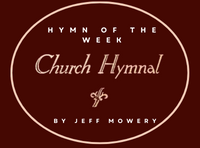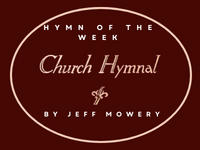The Friendly Beasts
Jesus our brother, kind and good
Was humbly born in a stable rude
And the friendly beasts around Him stood
Jesus our brother, kind and good.
“I,” said the donkey, shaggy and brown,
“I carried His mother up hill and down;
I carried her safely to Bethlehem town.”
“I,” said the donkey, shaggy and brown.
“I,” said the cow, all white and red
“I gave Him my manger for a bed;
I gave Him my hay to pillow His head.”
“I,” said the cow, all white and red.
“I,” said the sheep with curly horn,
“I gave Him my wool for His blanket warm;
He wore my coat on Christmas morn.”
“I,” said the sheep with curly horn.
“I,” said the dove from the rafters high,
“Cooed Him to sleep that He should not cry;
We cooed Him to sleep, my mate and I.”
“I,” said the dove from the rafters high.
Thus every beast by some good spell
In the stable dark was glad to tell
Of the gift he gave Emmanuel,
The gift he gave Emmanuel.
This may seem like an unusual song for the Hymn of the week, and in some ways, it is. I had never heard of this song until recently when my daughter, Gracie, began practicing it for her Christmas piano recital. I have attached a link of her recital (Proud Dad moment) if you care to watch it.
The song is unique in that it is written for the music to somewhat mimic the donkey, the cow, the sheep and the doves. I have really enjoyed listening to her play the song, and I think you will as well.
When I first read the lyrics to this song, I thought “Oh, what a cute little Christmas song!” And I wondered, “how long has it been around?” Well, the current version was written in the 1920’s, and is the modern adaptation of a song dating back to the 12th century – yes, over 800 years ago. There was a Latin song that was sung as part of a Christian feast/mass remembering the donkey that brought Mary to Bethlehem, and then helped them escape to Egypt. So, although it sounds like a song from our recent past, it’s origins are much older, and had a much more significant meaning.
One might wonder, were the animals selected here only picked because they seem like good manger scene kinds of animals? Barnyard animals like a Donkey, a cow, and a sheep. Those would have been the kinds of animals in the stable that night, right? But what about the doves? And why is the cow – red and white?
Well, I don’t think these animals were picked by chance, and let me explain why. There are four animals included in this song that are also mentioned in different parts of the Old Testament sacrificial system.
Donkey – A donkey is an animal with a split hoof. It is, therefore, an unclean animal. The Hebrews would not eat it and would not sacrifice it. But there is an interesting passage found in Exodus 13:11-13. The passage reads as follows ““And it shall be, when the Lord brings you into the land of the Canaanites, as He swore to you and your fathers, and gives it to you, that you shall set apart to the Lord all that open the womb, that is, every firstborn that comes from an animal which you have; the males shall be the Lord’s. But every firstborn of a donkey you shall redeem with a lamb; and if you will not redeem it, then you shall break its neck. And all the firstborn of man among your sons you shall redeem.” We know, from Scripture, that a donkey is unclean according the to the Lord. But there is a way to redeem the firstborn of that donkey. There is a way to redeem that unclean thing. How? It can be redeemed by a lamb. The unclean thing can be redeemed by the blood of a lamb. The stubborn animal can be redeemed by the gentle animal. What a powerful image pointing to what the Lamb of God would do for us.
Cow – In the Old testament, there are specific instructions regarding a red heifer – a cow. In Numbers 19, the Bible says “Now the Lord spoke to Moses and Aaron, saying, 2 “This is the ordinance of the law which the Lord has commanded, saying: ‘Speak to the children of Israel, that they bring you a red heifer without blemish, in which there is no defect and on which a yoke has never come. 3 You shall give it to Eleazar the priest, that he may take it outside the camp, and it shall be slaughtered before him; 4 and Eleazar the priest shall take some of its blood with his finger, and sprinkle some of its blood seven times directly in front of the tabernacle of meeting. 5 Then the heifer shall be burned in his sight: its hide, its flesh, its blood, and its offal shall be burned. 6 And the priest shall take cedar wood and hyssop and scarlet, and cast them into the midst of the fire burning the heifer.7 Then the priest shall wash his clothes, he shall bathe in water, and afterward he shall come into the camp; the priest shall be unclean until evening. 8 And the one who burns it shall wash his clothes in water, bathe in water, and shall be unclean until evening. 9 Then a man who is clean shall gather up the ashes of the heifer, and store them outside the camp in a clean place; and they shall be kept for the congregation of the children of Israel for the water of purification;[a] it is for purifying from sin.” The sacrifice of the red heifer was for the purification from sin.
Sheep/ram – It doesn’t take long to find examples in the Old Testament about the sacrifices of sheep/rams/lambs. Rams were offered as peace offerings. A sheep without blemish was offered as a burnt offering and a peace offering to the Lord. Lambs were offered as part of the Passover offering. John’s words ring in my ears – “Behold! The Lamb of God who takes away the sin of the world.”
Doves – In Leviticus chapter one, the Bible says “And if the burnt sacrifice of his offering to the Lord is of birds, then he shall bring his offering of turtledoves or young pigeons. 15 The priest shall bring it to the altar, wring off its head, and burn it on the altar; its blood shall be drained out at the side of the altar. 16 And he shall remove its crop with its feathers and cast it beside the altar on the east side, into the place for ashes. 17 Then he shall split it at its wings, but shall not divide it completely; and the priest shall burn it on the altar, on the wood that is on the fire. It is a burnt sacrifice, an offering made by fire, a sweet aroma to the Lord.” The sacrifice of the doves was a sweet aroma to the Lord. Interesting passage in the Christmas story. When Jesus was brought to the temple after his birth, the Bible records in Luke chapter 2:22 “Now when the days of her purification according to the law of Moses were completed, they brought Him to Jerusalem to present Him to the Lord 23 (as it is written in the law of the Lord, “Every male who opens the womb shall be called holy to the Lord”),[f] 24 and to offer a sacrifice according to what is said in the law of the Lord, “A pair of turtledoves or two young pigeons.”
It is interesting how the animals in this song have important Biblical meaning to the Hebrews.
But I also see some practical meaning for you and me thousands of years after the sacrificial system has been put away with and hundreds of years after the original inspiration of this song.
The Donkey – The Donkey in this song sacrificed himself by working. He was a beast of burden. He worked and carried the mother of Jesus. His work was his gift.
The Cow – The Cow offered his food, his hay, to the Lord for a place to lay His head. He sacrificed his physical needs to the Lord. His personal provision was his gift.
The Sheep – The Sheep in this song offered part of himself – his wool. He gave part of himself that the Babe would be warm. Part of who he was, was his gift.
The Dove – The Doves offered their worship in song. They cooed the savior to sleep as their sacrifice of praise. Praise was their gift.
So let me ask you today. What gift do you have to bring the Lord? What sacrifice can you make for the Babe in the manager? Is God calling you to sacrifice your work and your effort to labor in His vineyard? Is the Lord calling you to a fast – to sacrifice temporary food for eternal food? Are you willing to give of yourself – your talent, your time, your energy for Kingdom work? Are you willing to offer a sacrifice of praise to the Lord? Not just praise when everything is going right, but a sacrifice of praise when things are not going right.
Jesus, our brother, kind and good, was humbly born in a stable rude. He came as a baby into this world, lived a sinless life, and died for you and died for me. What gift can you offer Him as a sacrificial gift this Christmas season?

